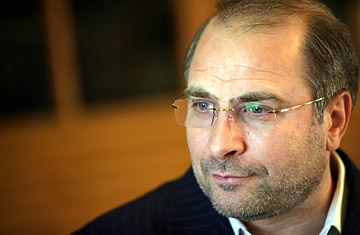
Tehran mayor Mohammad-Baqer Qalibaf in his office.
Mohammad-Baqer Qalibaf, the mayor of Tehran, is emerging as a quiet rival to President Mahmoud Ahmadinejad. Described as a moderate conservative, Qalibaf is likely to be a contender for the presidency in next year's national elections, though he refuses to talk directly about his plans. He does however maintain that he and Ahmadinejad have "tastes" that "are very different" — and that they are clearly not friends. Many political observers believe Qalibaf is behind the Reformist Fundamentalists' Coalition, which split from the main conservative coalition before last week's elections. (Candidates loosely allied with the coalition have captured 70 seats in the new parliament.) They also believe he has the support of some of the country's most influential clerics. He spoke with TIME's Nahid Siamdoust in Tehran as the election results were coming in. Pressed to predict whether his "taste" or Ahmadinejad's would triumph in future Iranian elections, Qalibaf simply says, "That the people will decide." Excerpts from the interview:
TIME: What is the ideal Iran that you envision?
Qalibaf: As a national leader, if I should be in that position of responsibility, we must make sure to use all our potential and capability toward the country's progress. We must create the right setting for the technical, scientific and economic needs of our young people, and respect people's private sphere. Neither Islam nor the revolution gives us the right to interfere in people's private lives.
Your talk is different from Ahmadinejad's...
We have different tastes. There are those who have narrow views. I don't agree with those views.
You have said that you're not supported by the presidency...
Our expectations were that because Ahmadinejad was a mayor of Tehran himself, we'd be able to collaborate much better. But these expectations were not met. Professionally, our relations are not very warm ...
How do you see last week's parliamentary elections?
Neither of the traditional groups on the left or right got clear majorities. So I believe that this Third Wave that we've foreseen will take shape in the coming majlis [parliament].
What do you mean by a Third Wave?
It's not a political movement like as a party. I think it's more a belief or a phenomenon that's happening in our society and that the majority of our people are tired of extremism and the exaggerations of the factions on the right and the left, and generally of factionalism altogether. Society is moving in a direction to put people with expertise in charge, people who are both idealistic but also realistic. The extremists of both currents will be eliminated, and the majlis will move toward moderation, reason and pragmatism.
But why then did a turnout of 60% vote produce a parliament with mostly pro-Ahmadinejad legislators? Is that not then a vote of confidence for the current government?
I don't believe that people voted for the government. I think people came to the ballot boxes to vote for their revolution, their state, and their Leader [Ayatollah Ali Khamenei, theocratic Iran's paramount politico-spiritual authority and unquestioned ruler]. That's a point where the West misunderstands us and our elections.
What do you mean?
What I'm saying is that people's relations with this republic and their revolution is strong. I myself and hundreds of thousands of people like me have been nurtured in this Islamic culture. We believe that the ideals for which we mounted a revolution can provide us with both material and spiritual growth and also guarantee our well-being in the other world, and hence, allow us to live with dignity in this world. I and thousands like me who fought Saddam's forces in the battlefields are bringing the same mentality to our work.
So the revolution makes you who you are today?
The biggest factor was the process of the revolution. I was 16, 17 when the revolution happened, and from two years prior I was involved in the uprisings against the Shah. After the success of the revolution I was a commander in the war, and we were constantly making decisions in situations of crises. This has affected very much our self-confidence, how our character and attitudes have been shaped, but also our management style, our attention to reason. You can't be irrational in war.
How about Iran's youth, who form a majority of Iran's population and have no memory of the revolution and at best very little memory of the war...?
That doesn't mean that they're distancing themselves from the revolution. That's where the West is wrong. The shining example for that is their participation in these last parliamentary elections, where more than half of the ballots were cast by young people 30 and below. But it's natural that these younger generations have newer outlooks on life and we must accommodate them. The world is going through constant change and I believe that there are a lot of good things happening in the West that we can use here in Iran. Just because we've had an Islamic revolution doesn't mean we can't take example of good developments in other parts of the world.
You are often called an Islamic modernizer, and even compared to historical figures who've brought progress to this country. Who are your role models?
I think one of the people who has had the most impact on me, certainly in my professional life, is Shahid Beheshti [one of the founding members of the Islamic Republic and its leading jurist and constitutionalist; assassinated in 1981]. He was someone who had lived both in the West as well as in the Qom seminaries. He was an open-minded intellectual fully confident in Islamic teachings as well as Western matters. He was also a very attractive man, both on the inside and the outside. His face and words were both captivating.
